Wednesday Feb 18, 2026
Wednesday Feb 18, 2026
Thursday, 15 June 2023 00:45 - - {{hitsCtrl.values.hits}}
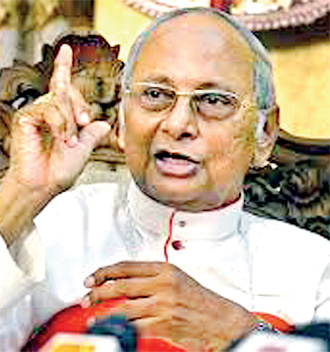
Elections or Ouster
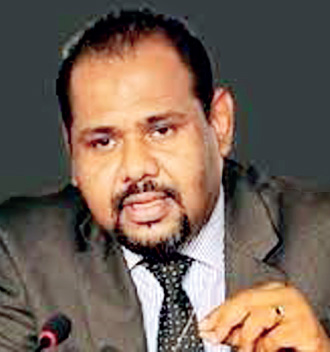
Indignity imposed
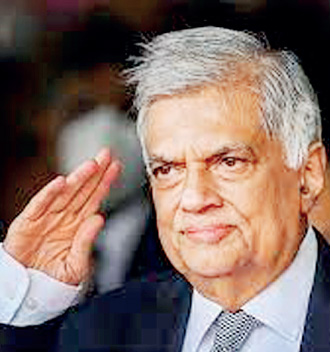
Busting pillars
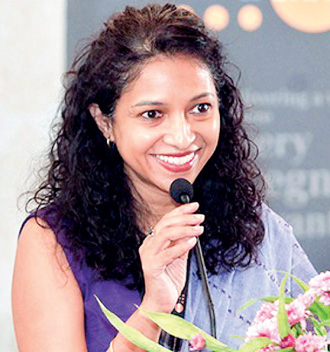
UNFPA: ‘Multidimensional Crisis’
|
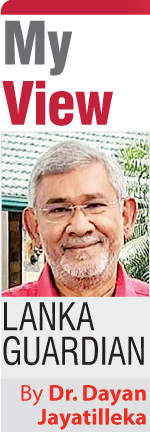 In 1964 Lake House defeated the SLFP’s Press Bill, defending press freedom, toppling the Government, and shaping the general election which the more liberal UNP won. In 2023 UNP leader and Lake House scion Ranil Wickremesinghe is moving to straitjacket the electronic media (‘broadcasting’). The irony is perverse.
In 1964 Lake House defeated the SLFP’s Press Bill, defending press freedom, toppling the Government, and shaping the general election which the more liberal UNP won. In 2023 UNP leader and Lake House scion Ranil Wickremesinghe is moving to straitjacket the electronic media (‘broadcasting’). The irony is perverse.
On this island, history seems to move in cycles, i.e., circles, but not flat ones. Listening to the shouts of ‘Kotiya’ (Tiger) in Parliament that met the speech raising a matter of privilege by Gajan Ponnambalam, MP, I was reminded of UNP Minister Cyril Mathew’s rudely racist remarks hurled at TULF and Opposition Leader Appapillai Amirthalingam in the run-up to July 1983.
Gajan Ponnambalam and I have debated fiercely on the war, peace, Prabhakaran and the impending presidential election in the Fall of 2005 at Georgetown’s CSIS at an event chaired by Ambassador Teresita Schaeffer, with Ambassador Bernard Goonetilleke a fellow panellist and Ambassador Ariyasinghe (DHM) in the audience.
We continue to disagree, though I applaud his parliamentary oratory. However, the entire affair of the arrest, from the first episode at the compound (captured on video), through the encounter at Gajan’s home, to the exchanges in Parliament, made me conscious that 75 years after Independence, on President Ranil Wickremesinghe’s watch, this is the indignity being imposed upon and suffered by the grandson of Ceylon’s first Minister of Industries, G.G. Ponnambalam, leader of the Tamil Congress, who had been persuaded to join the 1948 government by Prime Minister D.S. Senanayake. We’ve come a long way baby, and with respect to civility it’s been downhill.
Three pillars down
The architecture of the Ceylonese order at Independence had two pillars. One, the UNP built by D.S. Senanayake. The other, Lake House built by D.R. Wijewardena.
A decade later the architecture had a third pillar, the SLFP founded by S.W.R.D. Bandaranaike, furnishing Ceylon with a viable two-party democracy two decades before the world’s most populous democracy India elected a non-Congress government.
Ranil Wickremesinghe destroyed the UNP as an electorally viable mass party. When he took over its leadership it was the island’s largest single party.
His parents had practiced the politics of polarisation which generated the backlash that lost Lake House to state takeover. That’s two pillars down—D.R. Wijewardena’s Lake House and D.S. Senanayake’s UNP—at the hands of one nuclear family. The third pillar, the SLFP was destroyed during and due to the coalition with Ranil as PM. That’s the hattrick. Ranil will also wreck the SLPP and any SJB element that aligns with him.
I won the prize for best results in Political Science (Jayadeva Uyangoda was a contemporary and competitor) instituted by Ranil’s uncle Bishop Lakshman Wickremesinghe (obtaining the best results in the subject since his in 1952) in honour of his grandfather C.L. Wickremesinghe. I think I have the qualifications and the responsibility to raise the ineluctable question: will Ranil’s presidential tenure leave liberal democracy, the social fabric and the market economy in shreds?
Procrustean President
President Wickremesinghe’s paradigm is that of Procrustes. Having got the country onto the surgical table of an IMF agreement, he is seeking not merely to perform imperative laser-surgery, but to amputate the patient’s limbs so as to fit the framework of his long-standing economic doctrine. He is performing the amputation without the anaesthesia of elections. Something triggers associations with the Omen trilogy (where smooth-faced Damien, played by David Janssen, becomes President).
Ranil Wickremesinghe belongs to the ideologically extremist, politically confrontationist tradition of the family duo that ended the proud independence of Lake House founded by his grandfather D.R. Wijewardena and protected through the pragmatic balancing by DR’s young son, Ranil’s uncle, the Cambridge-educated ANCL Chairman. The Cold War ideological confrontationism of Ranil’s parents caused the Lake House library, a treasure-trove, to be burned by demonstrators in 1970 and the grand institution itself to be gobbled-up by the state in 1973, never to be disgorged (even under JRJ).
My father, Mervyn de Silva, broadly a sympathiser of the SLFP-LSSP-CPSL coalition, had as Deputy Editor in 1965-1970 and an independent-minded Editor-in-chief (later to be dismissed by Mrs. Bandaranaike) fought tooth-and-nail against the extreme rightwing Wickremesinghe course, supporting the ANCL Chairman with realist counsel (and hand-coloured maps of electoral trends pre-1970) in order to preserve the independence of Lake House. But Ranil’s folks, enraptured by their ideological agenda, were oblivious of the social mood and the country’s ethos.
It’s happening again. President Wickremesinghe recently commended B.R. Shenoy, an idiosyncratic Hayekian economist from India, asserting that had the reform agenda he presented in 1965 been implemented, Sri Lanka would have avoided the situation it is in and been a developed country. Ranil seems to forget, as do Sri Lanka’s Shenoy fans (including the new COPF Chairman), how that story went.
Ranil’s father Esmond Wickremesinghe sought an economic program for Ceylon from Shenoy, secured the endorsement of Minister J.R. Jayewardene, and drove the radical rightist economic agenda through the Lake House press while advocating for good measure, the ‘Indonesia (post-coup Suharto) model’. On the latter, Mervyn opposed him in print, having just returned from pre-coup Indonesia. Pushback against the Shenoy agenda came from Prime Minister Dudley Senanayake, planning tzar Gamani Corea and his deputy Godfrey Gunatilleke, who warned (prophetically) that savings from slashing welfare will be dwarfed by the rise in military expenditure. The political struggle over the Esmond-Shenoy policy coup pretty-much fissured the UNP Government, helping the Opposition SLFP-LSSP-CPSL secure for the first time since 1948, a 2/3rds majority at the parliamentary election of 1970.
In a replay, the external (Geneva 2015), ethnic (non-unitary Constitution) and ‘Shenoyist’ economic policies of the Ranil Wickremesinghe Prime Ministership under Yahapalanaya, sundered that hybrid government and the SLFP, spawning the SLPP and generating the backlash that gave the Mahinda-led SLPP alliance a two-thirds majority in August 2020, after Gotabaya had won with a lesser percentage in November 2019.
Today, President Wickremesinghe is not implementing merely the IMF agreement but also the Shenoy model, turbo-boosted by the policy package of Venezuelan neoliberal Ricardo Hausmann, Ranil’s advisor from back in 2015-2019. What monstrous outcome will result from this extremist politico-economic experimentation in Dr. Hausmann’s ‘Lab’?
Accumulation of poverty
More data pours in on the accumulation of poverty in contemporary Sri Lanka.
 “…at least 7 million Sri Lankans now living in poverty with 4 million of them having fallen into poverty since 2019…The research also found that poverty across all nine provinces has increased since 2019.
“…at least 7 million Sri Lankans now living in poverty with 4 million of them having fallen into poverty since 2019…The research also found that poverty across all nine provinces has increased since 2019.
 The study found that the coverage of social safety nets was low across all programs including the Samurdhi benefit.
The study found that the coverage of social safety nets was low across all programs including the Samurdhi benefit.
 LIRNEasia revealed that only 31% of the 10% of the poorest households receive Samurdhi cash transfers.
LIRNEasia revealed that only 31% of the 10% of the poorest households receive Samurdhi cash transfers.
 Estate communities continue to be the worst off with at least 51% of them continuing to live in poverty.
Estate communities continue to be the worst off with at least 51% of them continuing to live in poverty.
 Many households reduced their food consumption due to the economic crisis. 47% limited their portion sizes at meal times, 33% ate fewer meals a day, 27% restricted adult food consumption to allow children to eat,” the report said…” (Only 40% poor among 1.7 million Samurdhi beneficiaries: LIRNEasia | Daily FT)
Many households reduced their food consumption due to the economic crisis. 47% limited their portion sizes at meal times, 33% ate fewer meals a day, 27% restricted adult food consumption to allow children to eat,” the report said…” (Only 40% poor among 1.7 million Samurdhi beneficiaries: LIRNEasia | Daily FT)
Another news report on the LIRNEAsia survey spotlights rural and urban poverty.
 “…In the rest of rural Sri Lanka poverty has doubled from 15 to 32 percent from 2019 to 2023.
“…In the rest of rural Sri Lanka poverty has doubled from 15 to 32 percent from 2019 to 2023.
 In urban areas, which are densely populated, poverty tripled to 6 to 18 percent.
In urban areas, which are densely populated, poverty tripled to 6 to 18 percent.
 About 32 percent of families had sold household assets and 50 percent had run down their savings…
About 32 percent of families had sold household assets and 50 percent had run down their savings…
 Another 6 percent did not send their children to school…” (EconomyNext)
Another 6 percent did not send their children to school…” (EconomyNext)
Multi-dimensional crisis
The situation is not ‘normalising’. The large-scale social suffering is not ‘normal’. We have not seen this in our lifetime.
“The multiple dimensions of the crisis in Sri Lanka have affected people in all walks of life,” alerts the UNFPA’s Sharika Cooray:
‘… “This is a multi-dimensional crisis,” says Sharika. “…The household income has decreased causing severe impact... With many experiencing losses of jobs, others struggle with a lack of increase in wages, impacting rising household expenses.”
The burden of managing households has become the responsibility of women. She says the crisis means anxiety within the household. With the economic and political turmoil, many men are unemployed and women are finding alternative jobs to supplement the household income.
“…when men lose their jobs, they use their power to torment and control to vent their frustration. Women bear this brunt. These have a long-lasting impact beyond the crisis.”
… “What we hear from the shelters we support is that men who are not able to find employment are frustrated. The increase in use of drugs by men has further contributed towards higher risks of intimate partner violence and domestic violence which are very brutal in nature.”
…With services stretched to the breaking point by the ongoing crisis, Sharika says… “Sexual harassment in public spaces has increased and there is a lack of law enforcement support to protect women and girls.”
The country is going through collective trauma as families are struggling to plan for the next day or next week. “People’s life savings have depleted and they are forced to earn for their everyday survival.”
…The struggles to get by have left little time to reflect. “People do not have time to heal,” she says… (UNFPA Asiapacific | Profile: Sharika Cooray, UNFPA Sri Lanka)
That is the larger social reality. In an interview with Singaporean TV, Dr. Harsha de Silva commended President Wickremesinghe’s achievement saying that “the economy is stabilising”. President Premadasa would have educated him that an economy that is ‘stabilising’ while society is de-stabilising, in free-fall, is meaningless. SJB presidential candidate Sajith Premadasa must surely be the ‘voice of the voiceless’ poor, as Ranasinghe Premadasa was in 1988.
|
|
That’s Cuba
|
Exorcise dictators
His Eminence, Cardinal Malcolm Ranjith, speaking powerfully at the centenary celebrations of St. Anthony’s College, Katana, was inspired to shine a light on the political truth:
‘“…Therefore, let us prepare. An election is our right that is imperative to every citizen above the age of 18 to decide the future of this country. We ask for that right,” he said.
“After initially claiming there were no funds, they now boast about their financial resources. If resources are indeed available, they should proceed with the election and let the people express their views. We will not permit those who gained power through illegitimate means to abuse their authority and impose laws that restrict the freedoms of the people, leading our nation down the path of dictatorship. Let this serve as a reminder to the leaders.” he added.
“Today, the leaders of the country are working hand in hand to turn justice into injustice, turn governance into dictatorship, and lead the society from law-abiding to lawlessness. Therefore, we must prepare for the possibility of driving out such people. Such people are not fit to rule this country. They should be ousted,” he said. (Cardinal calls for ousting of unsuitable leaders | Daily FT)
Meanwhile the main Opposition deludes itself by speculating about a snap presidential election and expressing willingness to support Constitutional amendments to make that possible. Instead, it should be convening a roundtable of all political parties in and outside parliament to campaign for a presidential election on schedule, wrested from an unelected President who may refuse to release funds for that election.
Static SJB
Despite the social crisis, the SJB is stagnating, not growing. A low-growth party isn’t the best advertisement for its aspirational claim to be creator of a high-growth economy.
“…Support among likely voters for the NPP/JVP fell 8 points to 32% but it maintained an edge over the SJB whose support remained unchanged at 30%...Dr Ravi Rannan-Eliya, SLOTS lead investigator and IHP Executive Director… said that the stability of SJB support over the past year suggests it has a core support of loyal voters who account for one in four of the electorate but that the SJB seems to be finding it difficult to expand its support beyond that…” (UNP Gains Voter Support in April – Groundviews)
Why? Two main reasons: confusion and inexperience. Confusion or obfuscation is manifest in the following triumphant tweet by Dr. Harsha de Silva.
‘Happy to note that, despite a tough fight against the @Podujana Party government, the opposition triumphed, securing the rightful position of Chairman of COPF. Groundbreaking moment as President @Ranil_UNP personally intervened, endorsing my name proposed by the #lka Opposition.’
The enemy is depicted solely as the ‘Podujana Party Government’. The ‘Government’ is not seen as the Ranil Wickremesinghe administration, though Ranil is the head of state, the head of Government and presides at Cabinet meetings.
As the economy shrinks or is shrunk, poverty grows, shrinking the economy further, causing a vicious cycle which turns into a downward spiral. Sajith Premadasa was the first to criticise the Ranil-IMF strategy of economic constriction. Harsha contradicted that critique and endorsed the constriction strategy, insisting “you can’t drive in contradictory directions simultaneously” in his speech during the IMF debate.
Harsha’s tweet framing President Wickremesinghe as a partner/potential partner of the Opposition, impedes the party positioning itself as anti-incumbent. Why should any voter suffering from economic austerity, vote for the SJB which regards itself as on the same side of the barricades as the President with his ‘shock therapy’?
With the exception of Sajith (because of his father), Imtiaz Bakeer Markar and a few others, no one in the SJB has worked in a successful UNP Presidential campaign (SLFP-dissident Maithripala Sirisena’s doesn’t count) or with an elected UNP President. SJB strategists/planners are proteges of Ranil who has been popularly elected only as PM, i.e., No 2 in a presidential system, with 15 years in-between stints, and who crashed and burned the UNP on his last outing. Their political strategy has kept the SJB penned in the old UNP ‘social bloc’ comprising 25%-30%.
SJB’s silly season
Earlier this year during the abortive election campaign, frontline SJB speakers yelled that if the JVP-NPP was ever elected to lead the country, Sri Lanka would be another North Korea or Cuba. Opinion polls showed it didn’t work. This isn’t Florida, and red-baiting didn’t work for the Republicans even in Georgia. Trashing Cuba won’t get the youth vote, still less that of generations of the university-educated in Sri Lanka.
For the past quarter century Cuba has brought a resolution before the UN General Assembly annually against the US economic embargo of the island and scored about 190 votes ‘for’ to 3 ‘against’—out of 193. That’s Cuba’s soft power, deriving from its excellent Human Development ratings, and generous medical assistance globally.
If Sri Lanka were to become another Cuba—which it won’t—we shall at least be able to watch The Rolling Stones in live concert. I’d like to share with my SJB friends this link to a classic rock anthem closing out the Stones ‘Havana Moon’ concert (shot as a movie by UK film director Paul Dugdale), so they can get a grip, before they sound off. The Rolling Stones - (I Can't Get No) Satisfaction (Havana Moon) - YouTube